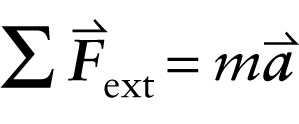Newton's second law of motion (4-2)
Question 1 of 3
Question
The magnitude of acceleration that the net external force causes depends on the mass m of the object (the quantity of material in the object). The greater the mass, the smaller the acceleration.
{"title":"If a net external force acts on an object...","description":"Wrong","type":"incorrect","color":"#99CCFF","code":"[{\"shape\":\"rect\",\"coords\":\"63,23,102,85\"},{\"shape\":\"poly\",\"coords\":\"82,133\"}]"} {"title":"...the object accelerates. The acceleration is in the same direction as the net force.","description":"Incorrect","type":"incorrect","color":"#ffcc00","code":"[{\"shape\":\"rect\",\"coords\":\"118,11,119,13\"},{\"shape\":\"rect\",\"coords\":\"260,27,297,83\"}]"} {"title":"The magnitude of acceleration that the net external force causes depends on the mass m of the object (the quantity of material in the object). The greater the mass, the smaller the acceleration.","description":"Correct!","type":"correct","color":"#333300","code":"[{\"shape\":\"poly\",\"coords\":\"113,132\"},{\"shape\":\"rect\",\"coords\":\"209,47,259,82\"}]"}Review
One of these relationships, commonly known as Newton’s second law, is the most important for our discussion of forces. It states that
If a net external force acts on an object, the object accelerates. The net external force is equal to the product of the object’s mass and the object’s acceleration.

